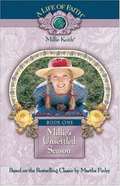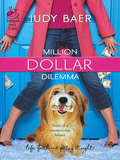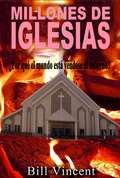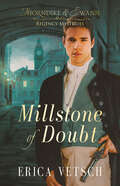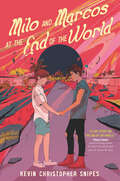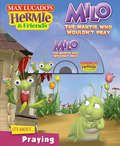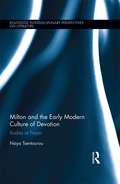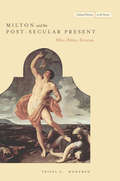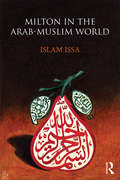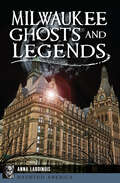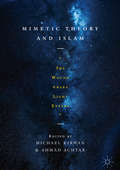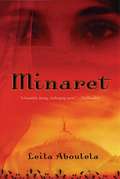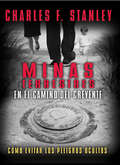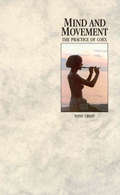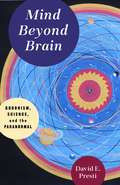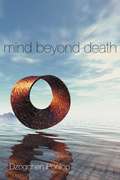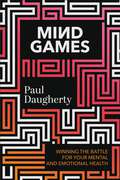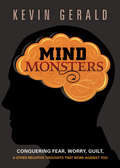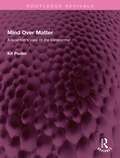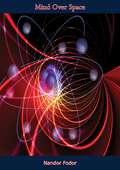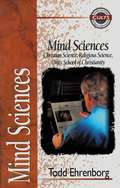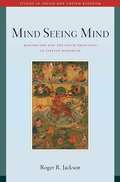- Table View
- List View
Millie's Unsettled Season, A Life Of Faith Millie, Book 1
by Martha FinleyLong Synopsis: Taken from the Back Cover: "Millie Keith, a bright and energetic twelve-year-old living in the charming town of Lansdale, Ohio, in 1833. Her world is about to be turned upside down when her Pappa announces that he is moving the family west to an undeveloped town on the frontier. The eldest daughter of eight lively children, Millie must shoulder responsibility for her mischievous brothers and sisters on the perilous journey and learn to trust God for her uncertain future....Millie's Unsettled Season is the first book in the A Life of Faith: Millie Keith Series, which follows the exciting life and times of Millie Keith. Based on and adapted from Martha Finley's 1876 sequel to the popular Elsie Dinsmore novels, this revised and updated, modern-language edition introduces readers to yet another delightful Christian heroine." The language of this novel is updated and modernized by Kersten Hamilton.
Million Dollar Dilemma
by Judy BaerI'm a P. K. , preacher's kid (or if I want to get fancy, a T. O. , theologian's offspring). I grew up afraid of my own allowance. . . . So when over $20 million falls into her lap, Cassia Carr views her Midas touch as a cross, not a blessing--and certainly doesn't anticipate the difficulty of giving it all away!And it's hard enough to gauge romantic feelings without the chaos of a major windfall. Her globetrotting neighbor, Adam Cavanaugh, seems interested--but in Cassia or her fortune? When Adam abruptly disappears, should Cassia forget him or follow her heart to an unknown, life-changing destination?
Millones de Iglesias: ¿Por qué el mundo está yéndose al infierno?
by Bill VincentYa sea que todos lo admitan o no, la iglesia tradicional está en graves problemas y ha estado luchando durante años por sobrevivir. Hay un pequeño ascenso de algunas iglesias nuevas y no tradicionales que nos ayuda a darnos cuenta de que Dios verdaderamente tiene una nueva manera de hacer iglesia. No existen las soluciones fáciles, pero al mismo tiempo, existen verdaderas raíces que se revelan en este libro. La iglesia no necesita otro programa ni otra organización religiosa. No necesitamos líderes religiosos sino líderes compasivos y centrados en Cristo. Bill Vincent es un profeta de Dios con una palabra fuerte que toda la iglesia necesita escuchar. Él revela que hay tantas iglesias, grandes y pequeñas, que se reúnen y guardan silencio mientras que el mundo empeora en muchas áreas. El hecho es que el mundo e incluso algunas iglesias están de camino al infierno. Debemos escuchar la urgencia de todo lo que Dios ha puesto en el corazón de Bill Vincent y muchas otras voces proféticas como la de él. Tantas iglesias en los Estados Unidos. ¿Por qué está este país en tan mal estado? Alguien está siendo descuidado y está cometiendo errores. Esta es la razón por la que no podemos ir a la iglesia simplemente como espectadores cuando se nos pide que oremos por una persona o un país. Necesitamos tomar esto en serio y realmente esforzarnos e interceder, en vez de ignorar el asunto y dejárselo a la otra persona. Aquí es donde alguien sería descuidado o estaría cometiendo errores. Tú sabes por qué han sucedido cosas malas en los Estados Unidos: la razón es que Dios está tratando de hacer que este país despierte y crea que hay un poder más alto aquí, y no estamos hablando del presidente de los Estados Unidos.
Millstone of Doubt (Thorndike & Swann Regency Mysteries #2)
by Erica VetschRegency London's detective duo is back on a new case--and this one is going to be a killerCaught in the explosion of the Hammersmith Mill in London, Bow Street Runner Daniel Swann rushes to help any survivors only to find the mill's owner dead of an apparent gunshot.Even though the owner's daughter, Agatha Montgomery, mourns his death, it seems there are more than a few people with motive for murder. But Daniel can't take this investigation slow and steady. Instead, he must dig through all the suspects as quickly as he can, because the clock is ticking until his mysterious patronage--and his job as a runner--comes to an abrupt and painful end. It seems to Daniel that, like his earthly father, his heavenly Father has abandoned him to the fates.Lady Juliette Thorndike is Agatha's bosom friend and has the inside knowledge of the wealthy London ton to be invaluable to Daniel. She should be in a perfect position to help with the case. Still, her instructor in the art of spy craft orders her to stay out of the investigation. But circumstances intervene, dropping her into the middle of the deadly pursuit.When a dreadful accident ends in another death on the mill floor, Daniel discovers a connection to his murder case--and to his own secret past. Now he and Juliette are in a race to find the killer before his time runs out."Erica Vetsch once again weaves a classic tale of how the old affects the new. An artfully told story that will have you wondering at the outcome until the final pages are read."-- Ruth Logan Herne, USA TODAY best-selling author
Milo and Marcos at the End of the World
by Kevin Christopher SnipesAs natural disasters begin to befall them the closer they become, Milo and Marcos soon begin to wonder if the universe itself is plotting against them in this young adult debut by the playwright and creator of The Two Princes podcast, Kevin Christopher Snipes. Milo Connolly has managed to survive most of high school without any major disasters, so by his calculations, he’s well past due for some sort of Epic Teenage Catastrophe. Even so, all he wants his senior year is to fly under the radar.Everything is going exactly as planned until the dreamy and charismatic Marcos Price saunters back into his life after a three-year absence and turns his world upside down. Suddenly Milo is forced to confront the long-buried feelings that he’s kept hidden not only from himself but also from his deeply religious parents and community.To make matters worse, strange things have been happening around his sleepy Florida town ever since Marcos’s return—sinkholes, blackouts, hailstorms. Mother Nature is out of control, and the closer Milo and Marcos get, the more disasters seem to befall them. In fact, as more and more bizarre occurrences pile up, Milo and Marcos find themselves faced with the unthinkable: Is there a larger, unseen force at play, trying to keep them apart? And if so, is their love worth risking the end of the world?
Milo, the Mantis Who Wouldn't Pray
by Max LucadoWhen a big storm destroys Milo's Snack Shack, he doesn't know what to do and that includes just talking to God about it. Milo thinks he has to get God's attention in order for God to hear him. Milo finally learns prays and realizes that God has been helping him all along. Ironically, all the things he was using to get God's attention are the very things he needs to rebuild his Snack Shack. The garden learns an important lesson about how to trust God after we pray and that His answers come in many different forms.
Milton and the Early Modern Culture of Devotion: Bodies at Prayer (Routledge Interdisciplinary Perspectives on Literature)
by Naya TsentourouMiton and Early Modern Devotional Culture analyses the representation of public and private prayer in John Milton’s poetry and prose, paying particular attention to the ways seventeenth-century prayer is imagined as embodied in sounds, gestures, postures, and emotional responses. Naya Tsentourou demonstrates Milton’s profound engagement with prayer, and how this is driven by a consistent and ardent effort to experience one’s address to God as inclusive of body and spirit and as loaded with affective potential. The book aims to become the first interdisciplinary study to show how Milton participates in and challenges early modern debates about authentic and insincere worship in public, set and spontaneous prayers in private, and gesture and voice in devotion.
Milton and the Post-Secular Present
by Feisal G. MohamedOur post-secular present, argues Feisal Mohamed, has much to learn from our pre-secular past. Through a consideration of poet and polemicist John Milton, this book explores current post-secularity, an emerging category that it seeks to clarify and critique. It examines ethical and political engagement grounded in belief, with particular reference to the thought of Alain Badiou, Jacques Derrida, Jürgen Habermas, and Gayatri C. Spivak. Taken to an extreme, such engagement produces the cult of the suicide bomber. But the suicide bomber has also served as a convenient bogey for those wishing to distract us from the violence in Western and Christian traditions and for those who would dismiss too easily the vigorous iconoclasm that belief can produce. More than any other poet, Milton alerts us to both anti-humane and liberationist aspects of belief and shows us relevant dynamics of language by which such commitment finds expression.
Milton and the Puritan Dilemma, 1641-1660
by Arthur E. BarkerThis analysis of the progressive definition of John Milton's social, political, and religious opinions during the fertile years of the Puritan Revolution has become a classic work of scholarship in the thirty-five years since it was first published. Professor Barker interprets Milton's development in the light of his personal problems and of the changing climate of opinion among his revolutionary associates.
Milton in the Arab-Muslim World
by Islam IssaThe first full-length study of the reception of John Milton’s (1608-74) writings in the Arab-Muslim world, this book examines the responses of Arab-Muslim readers to Milton’s works, and in particular, to his epic poem: Paradise Lost. It contributes to knowledge of the history, development, and ways in which early modern writings are read and understood by Muslims. By mapping the literary and more broadly cultural consequences of the censure, translation and abridgement of Milton’s works in the Arab-Muslim world, this book analyses the diverse ways in which Arab-Muslims read and understand a range of literary and religious aspects of Milton’s writing in light of cultural, theological, socio-political, linguistic and translational issues. After providing an overview of the presence of Milton and his works in the Arab world, each chapter sheds light on how cultural and translational issues shape the ways in which Arab-Muslim readers perceive and understand the characters and motifs of Paradise Lost. Chapters outline the ways in which the figures are currently understood in Milton scholarship, before exploring how they fit into the narrative drama and theology of the poem, and their position in Islamic creed and Arab-Muslim culture. Concurrently, each chapter examines the poem’s subject matter in detail, placing particular emphasis on matters of linguistic, theological and cultural translation and accommodation. Chapter conclusions not only summarise the patterns and potentialities of reception, but point towards the practical functions of Arab-Muslim responses to Milton’s writing and their contribution to the formation of social ideas.
Milwaukee Ghosts and Legends (Haunted America)
by Anna LardinoisA tour guide and founder of Gothic Milwaukee shares the spine-tingling tales of the Beer City's famous, and not so famous, specters and legends. Beneath Milwaukee's calm façade, its ghastly past awaits. The overbearing spirit of Frederick Pabst keeps persistent watch over the mansion that shares his name. The remains of the Newhall House Fire, the city's deadliest disaster, may lie beneath a new building, but those who lost their lives that night refuse to rest in peace. Even the suburbs hold their share of ghoulish secrets, including the furtive dwarves of Haunchyville, the fabled Bray Road Beast and the stubborn spirits lurking in Deacon West's house. &“A breeze—a spine-tingling breeze—to read. It's extremely well crafted, organized into deliciously digestible segments and laden with descriptive yet straight-forward language. Lardinois stocks the stories with so many peculiar historical tidbits that the text is simultaneously scary, fascinating and educational. (Did you know the ashes of the founder of The Skylight Theater are still beneath the stage?)&” —OnMilwaukee.com
Mimetic Theory and Islam: "The Wound Where Light Enters"
by Michael Kirwan Ahmad AchtarThis volume explores the 'Mimetic Theory' of the cultural theorist René Girard and its applicability to Islamic thought and tradition. Authors critically examine Girard's assertion about the connection between group formation, religion, and 'scapegoating' violence. These insights, Girard maintained, have their source in biblical revelation. Are there parallels in other faith traditions, especially Islam? To this end, Muslim scholars and scholars of Mimetic Theory have examined the hypothesis of an 'Abrahamic Revolution.' This is the claim that Judaism, Christianity, and Islam each share in a spiritual and ethical historical 'breakthrough:' a move away from scapegoating violence, and towards a sense of justice for the innocent victim.
Minaret
by Leila AboulelaLeila Aboulela's American debut is a provocative, timely, and engaging novel about a young Muslim woman -- once privileged and secular in her native land and now impoverished in London -- gradually embracing her orthodox faith. With her Muslim hijab and down-turned gaze, Najwa is invisible to most eyes, especially to the rich families whose houses she cleans in London. Twenty years ago, Najwa, then at university in Khartoum, would never have imagined that one day she would be a maid. An upper-class Westernized Sudanese, her dreams were to marry well and raise a family. But a coup forces the young woman and her family into political exile in London. Soon orphaned, she finds solace and companionship within the Muslim community. Then Najwa meets Tamer, the intense, lonely younger brother of her employer. They find a common bond in faith and slowly, silently, begin to fall in love. Written with directness and force, Minaret is a lyric and insightful novel about Islam and an alluring glimpse into a culture Westerners are only just beginning to understand.
Minas terrestres en el camino del creyente
by Charles StanleyDr. Charles Stanley identifica siete tentaciones destructivas y brinda a los cristianos la esperanza y las destrezas que necesitan para vivir una vida abundante y obediente.Cuando usted está en lo más candente de la batalla espiritual, no lleva mucho tiempo para que se dé cuenta que Satanás hará lo que sea para evitar que usted se convierta en la persona que Dios ha planeado que sea. Sin embargo, él no siempre emplea un asalto frontal por todos los medios. A veces el peligro viene mediante esquemas sutiles y reservados: minas terrestres escondidas a lo largo de nuestras sendas. Estas minas, una vez detonadas, pueden paralizarnos espiritualmente e impedir que vivamos una vida abundante y obediente. En Minas terrestres en el camino del creyente, el amado pastor Charles Stanley muestra a los lectores cómo identificar, evitar o desactivar las minas del orgullo, los celos y la envidia, la inseguridad, el compromiso, la falta de perdón, el pecado sexual y la pereza.No es difícil evitar los problemas graves, dice el doctor Stanley, sobre todo si sigue la ruta que el Señor le ha dado para caminar. Dios sabe navegar cada campo de minas.
Mince Pie and Mistletoe
by Phyllis Mcginley"Hooray for the Dutch ! We owe them much, Jolly Mynheer and matron-- When they left the sands Of their Netherlands, Saint Nicholas was their patron (And good Saint Nick, The children's prince, Has been our Santa Claus Ever since.)"
Mind And Cosmos: Why The Materialist Neo-darwinian Conception Of Nature Is Almost Certainly False
by Thomas NagelThe modern materialist approach to life has conspicuously failed to explain such central mind-related features of our world as consciousness, intentionality, meaning, and value. This failure to account for something so integral to nature as mind, argues philosopher Thomas Nagel, is a major problem, threatening to unravel the entire naturalistic world picture, extending to biology, evolutionary theory, and cosmology. <p><p> Since minds are features of biological systems that have developed through evolution, the standard materialist version of evolutionary biology is fundamentally incomplete. And the cosmological history that led to the origin of life and the coming into existence of the conditions for evolution cannot be a merely materialist history, either. An adequate conception of nature would have to explain the appearance in the universe of materially irreducible conscious minds, as such. <p> Nagel's skepticism is not based on religious belief or on a belief in any definite alternative. In Mind and Cosmos, he does suggest that if the materialist account is wrong, then principles of a different kind may also be at work in the history of nature, principles of the growth of order that are in their logical form teleological rather than mechanistic. <p> In spite of the great achievements of the physical sciences, reductive materialism is a world view ripe for displacement. Nagel shows that to recognize its limits is the first step in looking for alternatives, or at least in being open to their possibility.
Mind And Movement: The Practice of Coex
by Tony CrispBy using body movements and postures as doorways to our own natural healing process, we can actively release tension; find balance between the mind and the body; learn to dream creatively while awake; and tap areas of the unconscious thought unaccesible.Most physical movements and exercise are disconnected from our deepest drives, feelings and sources of healing. MIND AND MOVEMENT shows how to find a natural way healthy to healthy exercise and spiritual growth. The method of co-operating with our own internal healing and creativity has been known and used for centuries. In Japan it is called Seitai, in India Shaktipat; even the early Christian used this simple form of inner and outer hygiene.Recent research has linked this activity with the self-regulatory and dream proces within us. But, no other book has made plain to the public how to co-operate with these internal functions for one's own benefit.Tony Crisp has been writing about natural health and self help for thirty years. His special interest in the healing potential of the dream process led him to work as a therapist during the past fourteen years. It is out of this experience MIND AND MOVEMENT was written.
Mind Beyond Brain: Buddhism, Science, and the Paranormal
by David PrestiAmong the most profound questions we confront are the nature of what and who we are as conscious beings, and how the human mind relates to the rest of what we consider reality. For millennia, philosophers, scientists, and religious thinkers have attempted answers, perhaps none more meaningful today than those offered by neuroscience and by Buddhism. The encounter between these two worldviews has spurred ongoing conversations about what science and Buddhism can teach each other about mind and reality.In Mind Beyond Brain, the neuroscientist David E. Presti, with the assistance of other distinguished researchers, explores how evidence for anomalous phenomena—such as near-death experiences, apparent memories of past lives, apparitions, experiences associated with death, and other so-called psi or paranormal phenomena, including telepathy, clairvoyance, and precognition—can influence the Buddhism-science conversation. Presti describes the extensive but frequently unacknowledged history of scientific investigation into these phenomena, demonstrating its relevance to questions about consciousness and reality. The new perspectives opened up, if we are willing to take evidence of such often off-limits topics seriously, offer significant challenges to dominant explanatory paradigms and raise the prospect that we may be poised for truly revolutionary developments in the scientific investigation of mind. Mind Beyond Brain represents the next level in the science and Buddhism dialogue.
Mind Beyond Death
by Dzogchen PonlopAn indispensable guidebook through the journey of life and death, Mind Beyond Death weaves a synthesis of wisdom remarkable in its scope. With warm informality and profound understanding of the Western mind, the Dzogchen Ponlop Rinpoche makes the mysterious Tibetan teachings on the bardos—the intervals of life, death, and beyond—completely available to the modern reader. Drawing on a breathtaking range of material, Mind Beyond Death shows us how the bardos can be used to conquer death. Working with the bardos means taking hold of life and learning how to live with fearless abandon. Exploring all six bardos—not just the three bardos of death—Mind Beyond Death demonstrates that the secret to a good journey through and beyond death lies in how we live. Walking skillfully through the bardos of dream meditation and daily life, the Dzogchen Ponlop Rinpoche takes us deep into the mysterious death intervals, introducing us to their dazzling mindscape. This tour de force gives us the knowledge to transform death, the greatest obstacle, into the most powerful opportunity for enlightenment. With both nuts-and-bolts meditation techniques and brilliant illumination, Mind Beyond Death offers a clear map and a sturdy vehicle that will safely transport the reader through the challenging transitions of this life and the perilous bardos beyond death.
Mind Games: Winning the Battle for Your Mental and Emotional Health
by Paul DaughertyIn this important book, a megachurch pastor acknowledges the mental health crisis happening in our churches today and gives readers practical tools to fight back against depression, anxiety, and insecurity—and help them find victory. Depression, anxiety, and emotional trauma are on the rise, even more so after the painful few years we&’ve all been through. While the church has had an unfortunate track record of glossing over mental health issues, Paul Daugherty, pastor of the megachurch Victory, believes it&’s time for the church to break its silence. You can&’t just pray trauma away. Depression and anxiety can affect even the most devoted believer. In this book, Paul Daugherty walks readers through some of the biggest mental and emotional health issues he has seen people in his life and his congregation facing, including depression, anxiety, insecurity, mood swings, and the scars of trauma. Daugherty dives into scripture and lays a framework for understanding the spiritual truths behind each mental battle. He also offers practical tips and strategies to help readers find lasting victory. The result is an invaluable handbook that will help Christians and non-believers alike.
Mind Monsters: Conquering Fear, Worry, Guilt and Other Negative Thoughts that Work Against You
by Kevin GeraldEvery day we are bombarded with negative messages--from society, the media, and even from self-talk in our own minds. Take a minute to think about these questions: Do you lack peace because of your perspective? Do you focus on the problems around you? Do you have trouble recognizing the good things in your life? Do you feel despair or depression, despite your blessings? Answering yes to questions like these is evidence of mind monsters. Mind monsters are those negative thoughts we all battle, the creeping shadows in the corners of our minds that feed our insecurities, worries, and fears. They will steal your life...if you let them. But there is good news! You can take control. In Mind Monsters Kevin Gerald shows you how to recognize destructive thoughts, take them captive, and use biblical truths to overcome them. Today you have a choice: Will you allow your mind monsters to take up residence, affecting who you are and God’s plan for your life, or will you conquer them and experience a life that is positive, abundant, joyful, and overflowing with peace?
Mind Over Matter: A scientist's view of the paranormal (Routledge Revivals)
by Kit PedlerFirst published in 1981, Mind Over Matter stems from Kit Pedler’s TV series of the same name and is an engrossing, open-minded survey of all aspects of the paranormal. It controversially suggests that metal-bending, telepathy, precognition and out-of-body experiences may not after all be the domain of frauds alone. Although criticised over the years, the book still fills the readers with creativity and wonder, and maybe even provides some explanation for inexplicable events in life.
Mind Over Space
by Nandor FodorNandor Fodor was a British and American parapsychologist, psychoanalyst, author and journalist of Hungarian origin.Fodor was one of the leading authorities on poltergeists, haunting and paranormal phenomena usually associated with mediumship. Fodor, who was at one time Sigmund Freud's associate, wrote on subjects like prenatal development and dream interpretation, but is credited mostly for his magnum opus, Encyclopedia of Psychic Science, first published in 1934. Fodor was the London correspondent for the American Society for Psychical Research (1935-1939). He worked as an editor for the Psychoanalytic Review and was a member of the New York Academy of Sciences.Fodor in the 1930s embraced paranormal phenomena but by the 1940s took a break from his previous work and advocated a psychoanalytic approach to psychic phenomena. He published skeptical newspaper articles on mediumship, which caused an opposition from spiritualists."This book is a monograph of data gathered from ancient and modern records by patient research. It is fairly exhaustive and is not inspired by the spirit of debunking, rather, with a view that the human mind may have capabilities the limits of which we do not suspect. Let the reader determine for himself whether unknown electro-magnetic powers may exist may exist on the organismic level of the human psyche (or at the heart of all living things), and whether in exceptional conditions and in exceptional organisms such powers may manifest themselves in our own days, tendering the vision that in generations to come they may be available for development and control for the benefit of the whole human race."
Mind Sciences: Christian Science, Religious Science, Unity School of Christianity
by Alan W. Gomes Todd EhrenborgIs evil a state of mind that can be changed? Is there a latent divinity in us all? Is there a personal God? The answers to these questions given by the mind sciences: groups such as Christian Science, Religious Science, and the Unity School of Christianity are not the same ones given by orthodox Christianity. Moreover, these mind sciences appeal to many people who seek cures to illness that conventional medicine and Christianity do not offer. Can we put our trust in them? Why this series? This is an age when countless groups and movements, old and new, mark the religious landscape in our culture, leaving many people confused or uncertain in their search for spiritual truth and meaning. Because few people have the time or opportunity to research these movements fully, these books provide essential information and insights for their spiritual journeys. Each book has five sections: - A concise introduction to the group - An overview of the group's theology in its own words - Tips for witnessing effectively to members of the group - A bibliography with sources for further study - A comparison chart that shows the essential differences between biblical Christianity and the group -- The writers of these volumes are well qualified to present clear and reliable information and help us discern religious truth from falsehood.
Mind Seeing Mind: Mahamudra and the Geluk Tradition of Tibetan Buddhism (Studies in Indian and Tibetan Buddhism)
by Roger R. JacksonA definitive study of one of the most important practices in Tibetan Buddhism, with translations of a number of its key texts.Mahamudra, the &“great seal,&” refers to the ultimate nature of mind and reality, to a meditative practice for realizing that ultimate reality, and to the final fruition of buddhahood. It is especially prominent in the Kagyü tradition of Tibetan Buddhism, so it sometimes comes as a surprise that mahamudra has played an important role in the Geluk school, where it is part of a special transmission received in a vision by the tradition&’s founder, Tsongkhapa. Mahamudra is a significant component of Geluk ritual and meditative life, widely studied and taught by contemporary masters such as the Dalai Lama. Roger Jackson&’s Mind Seeing Mind offers us both a definitive scholarly study of the history, texts, and doctrines of Geluk mahamudra and masterful translations of its seminal texts. It provides a skillful survey of the Indian sources of the teaching, illuminates the place of mahamudra among Tibetan Buddhist schools, and details the history and major textual sources of Geluk mahamudra. Jackson also addresses critical questions, such as the relation between Geluk and Kagyü mahamudra, and places mahamudra in the context of contemporary religious studies. The translation portion of Mind Seeing Mind includes ten texts on mahamudra history, ritual, and practice. Among these are the First Panchen Lama&’s root verses and autocommentary on mahamudra meditation, his ritual masterpiece Offering to the Guru, and a selection of his songs of spiritual experience. Mind Seeing Mind adds considerably to our understanding of Tibetan Buddhist spirituality and shows how mahamudra came to be woven throughout the fabric of the Geluk tradition.
